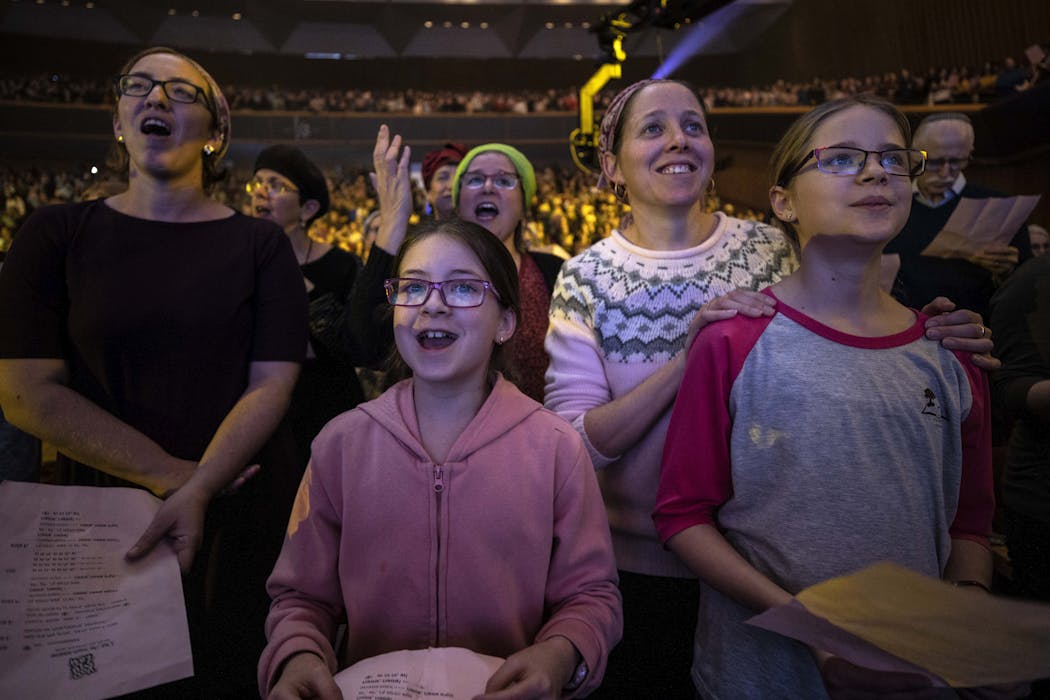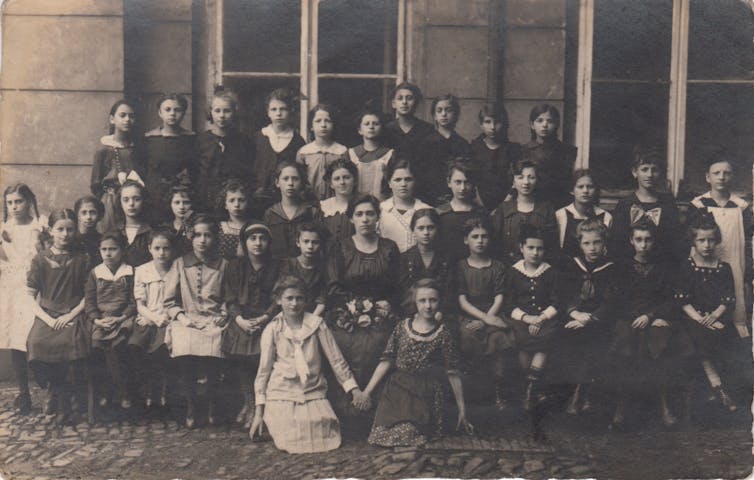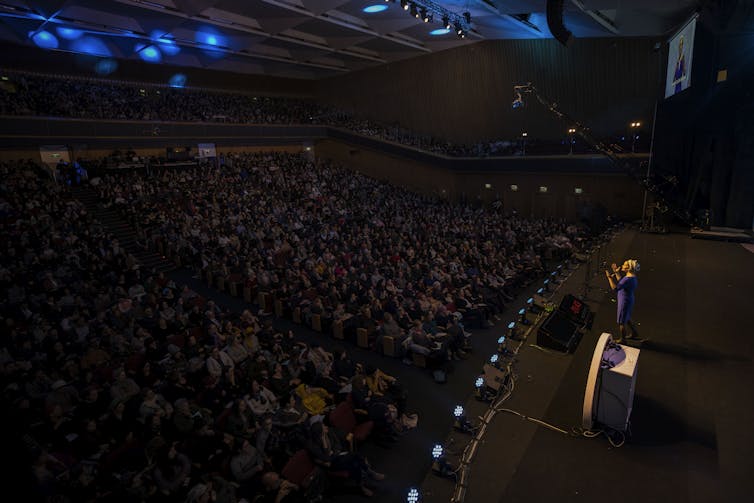Orthodox Judaism is making space for women’s religious leadership – even without traditional ordination
- Written by Michal Raucher, Associate Professor of Jewish Studies, Rutgers University
 Orthodox Jewish women attend an event celebrating the completion of the 7 1/2-year cycle of daily study of the Talmud, the central text of Jewish law, on Jan. 5, 2020, in Jerusalem.AP Photo/Tsafrir Abayov
Orthodox Jewish women attend an event celebrating the completion of the 7 1/2-year cycle of daily study of the Talmud, the central text of Jewish law, on Jan. 5, 2020, in Jerusalem.AP Photo/Tsafrir AbayovWhen people picture a rabbi, they may imagine a man standing in front of a congregation in a synagogue. But “rabbi” means much more than that. For example, a rabbi could be a teacher, a nonprofit executive for a Jewish organization or a scholar of Jewish law – and, increasingly, some of those roles are held by Orthodox women.
For decades, liberal denominations have permitted women to be ordained. Orthodox Judaism, however, has largely prohibited it. Yet attitudes toward women’s study of rabbinic texts is changing, leading some Orthodox leaders to conclude that women are qualified for rabbinic jobs.
Israel’s chief rabbis – known as the Rabbinate, and historically seen as the top authority for the country’s Orthodox institutions – do not recognize women as rabbis or permit their ordination. But a significant change came in July 2025, when Israel’s High Court of Justice determined that women must be allowed to take the Rabbinate’s exams about Jewish law. The chief rabbis appealed the decision, but the court rejected their request for a retrial in November.
These tests are required to apply for public sector jobs as any kind of Jewish religious authority in Israel: ensuring that restaurants adhere to Jewish dietary laws, for example. Passing does not make someone an ordained rabbi; ordination is conferred through private rabbis and schools, and most Orthodox communities do not recognize female rabbis. But it does allow women to apply for jobs previously available only to men and receive higher salaries for the educational jobs they have already. Most importantly, the High Court’s decision recognizes that women have achieved high levels of education in rabbinic law.
I am a scholar of Jewish women and gender who researches religious authority among Orthodox women. While there have always been highly educated women, the court’s ruling reflects a growing trend among Orthodox women, while also opening up professional opportunities.
From Torah to Talmud
Formed in the 19th century, Orthodox Judaism is oriented around a strict observance of Jewish law and commitment to traditional gender roles. The denomination contains many divisions, each one adjusting their observance of Jewish law differently in response to modernity. While boys and men have been traditionally educated in Torah and rabbinic texts, historically girls and women did not have access to any formal Jewish education.
In the early 20th century, Jewish Polish teacher Sarah Schenirer revolutionized Orthodox girls’ education by founding the Bais Yaakov school system, now found in many countries. The Bais Yaakov education focused on teaching women Torah, while maintaining women’s place within the Jewish home.
 A Bais Yaakov Orthodox school for girls in what is now Bielsko-Biala, Poland, around 1938.Collection of the Archive of the Jewish Community in Bielsko-Biala, Poland/Wikimedia Commons, CC BY-SA
A Bais Yaakov Orthodox school for girls in what is now Bielsko-Biala, Poland, around 1938.Collection of the Archive of the Jewish Community in Bielsko-Biala, Poland/Wikimedia Commons, CC BY-SABut soon another debate arose: whether women could study Talmud. This text, composed between the second and seventh centuries C.E., contains the building blocks of rabbinic law. Studying the Talmud means learning the language, references and argument style of the Jewish legal system, called “halakha.”
Supporters and opponents of Talmud study for women both argued that it would forever alter orthodoxy. Opponents feared that if women understood Talmudic discussions, they would be interested in participating more in public religious life, upsetting the gender norms at the heart of orthodoxy.
Yet, in the 1970s, some well-known rabbis in Israel and America invited women into Talmud study. Since then, the number of Orthodox institutions that offer advanced Talmud study for women has grown significantly. Fifty years ago, there were only two options: Stern College of Yeshiva University in New York, or Michlelet Bruriah in Israel, now called Midreshet Lindenbaum. Today, dozens of institutions offer programs for Orthodox women who want to study rabbinic law.
The institutions where women can learn Talmud and rabbinic law span the Orthodox landscape. Many are affiliated with open or modern orthodoxy, which have embraced changes related to gender roles. Some cater to the Haredi or “ultra-Orthodox” population, and others to communities in between.
Most students who complete these programs are not seeking traditional ordination as rabbis. But the women graduate prepared for several other types of religious leadership, such as Jewish education, or as halakha guides for other women. Some programs prepare students to answer Jewish legal questions in particular areas, such as practices during menstruation or childbirth.
Feminist network
This growth in opportunities for Orthodox women is the result of a network of Orthodox feminists working across borders since the 1970s.
 Orthodox women attend an event to celebrate the completion of a 7½-year cycle of daily Talmud study in Jerusalem on Jan. 5, 2020.AP Photo/Tsafrir Abayov
Orthodox women attend an event to celebrate the completion of a 7½-year cycle of daily Talmud study in Jerusalem on Jan. 5, 2020.AP Photo/Tsafrir AbayovMichlelet Bruriah, for example, was founded by two American Jews who immigrated to Israel in the 1960s. Several other educational institutions developed through this network – including Matan, Nishmatand Drisha, which are currently located in Israel.
Yeshivat Maharat, the first Orthodox seminary to ordain women as rabbis, is in New York. Several of its teachers and students came from these Israeli institutions, and some of their donors have also supported the schools in Israel.
The lawsuit challenging the Israeli chief rabbis’ restriction on women taking the Jewish law exam was filed by several people involved in this network.
Rabbi Seth Farber, for example, is an American immigrant to Israel and the founder of ITIM, a nonprofit that advocates for Jewish religious pluralism within Israeli society. He filed the lawsuit along with his wife, Michelle Cohen Farber, another American immigrant to Israel. She uses the title “rabbanit,” which traditionally refers to someone married to a rabbi. In her case, it also refers to her own expertise in Jewish legal texts: She co-founded Hadran, an organization that promotes Talmud study among women.
Other petitioners include Rabbanit Avital Engelberg, an Israeli-born graduate of Yeshivat Maharat who directs the seminary’s Israeli branch.
Impact
Women’s training allows them to enter a variety of fields. Opportunities for Orthodox women’s religious leadership is growing, and it’s not all about ordination. “Yoatzot halacha,” for example, counsel other women about issues related to marriage, sex and reproduction.
More broadly, these programs – and the Israeli court’s decision – validate women’s religious leadership. For decades, many Orthodox Jews have looked to Israel’s Orthodox rabbinate as the arbiter of religious authenticity. The ruling forces Orthodox Judaism worldwide to recognize that women can achieve high levels of Talmudic education.
Finally, the proliferation of educational programs reflects – and creates – a need within orthodoxy. It is not just a small cadre of women seeking these opportunities. Programs continue to open because there is a demand among Orthodox women for the chance to study rabbinic texts. As more institutions create programs for women, they are creating a new reality: one where Orthodox women are religious leaders.
Michal Raucher received funding from the Israel Institute, the University of Cincinnati, and the Hadassah Brandeis Institute to conduct research related to this article.
Authors: Michal Raucher, Associate Professor of Jewish Studies, Rutgers University

